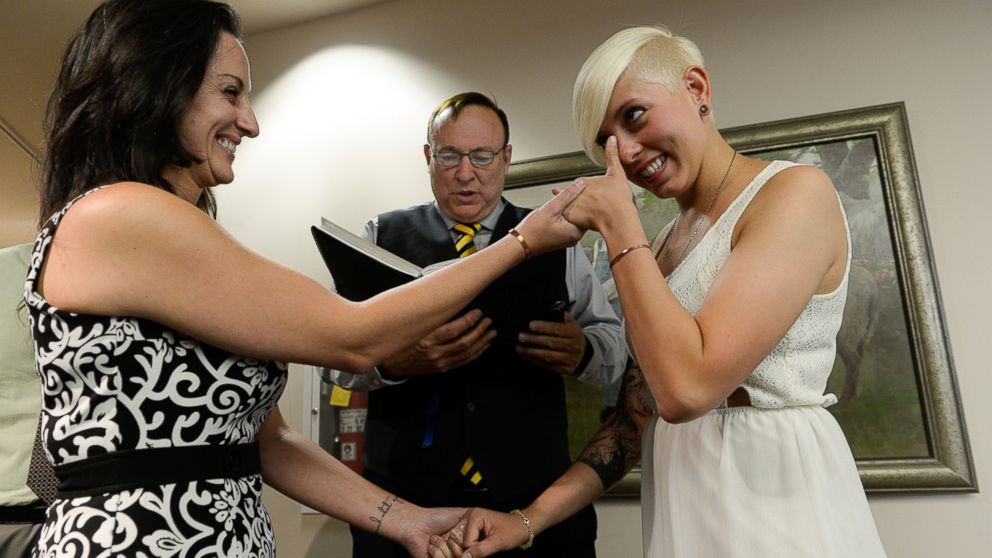Support for Gay Marriage Reaches Record High (POLL)
— -- A week before a closely watched U.S. Supreme Court hearing on the issue, public support for gay marriage reached a new high in the latest ABC News/Washington Post poll, with 61 percent of Americans – more than six in 10 for the first time – saying gays and lesbians should be allowed to marry legally.
Identical or similar majorities favor gay marriage on two key issues before the court: Sixty-one percent oppose allowing individual states to prohibit same-sex marriages. And 62 percent support requiring states to recognize gay marriages performed legally in other states.
See PDF with full results, charts and tables here.
These views extend a dramatic, decade-long evolution in public attitudes on gay marriage - one of the most remarkable re-evaluations of views on a basic social issue in more than 30 years of ABC/Post polling. As recently as June 2006, just 36 percent of Americans said it should be legal for gays and lesbians to marry. That advanced to 49 percent in 2009, reached a majority, 53 percent, in early 2011, and, as noted, 61 percent now.
Further, “strong” support for allowing gay marriage exceeds strong opposition by 15 percentage points in this poll, produced for ABC by Langer Research Associates, matching the largest pro-gay marriage margin in intensity of sentiment on record. In a similar question in 2004, by contrast, strong opposition exceeded strong support by 34 points.
Other attitudes have moved in tandem. In ABC/Post polls last year, 65 percent said that being gay or lesbian is the way people are rather than the way they choose to be, up 16 points from 1994. Sixty-one percent also supported allowing gay couples to adopt children, up from 29 percent in 1992, and 78 percent said gays “can be as good parents as straight people,” up by 21 points from 1996. Eighty-one percent said business should not be allowed to refuse service to gays and lesbians; 65 percent said so even if the business owners object on religious grounds. (At the same time fewer, 50 percent, saw gay marriage as a constitutional right; 43 percent did not, with the rest unsure.)
These trends have been associated with increased familiarity with gays and lesbians. In polling by Gallup in 1983, 24 percent of Americans reported having a friend or acquaintance who was homosexual. That’s risen to three-quarters now.
Same-sex marriage is legal in 36 states, up from six three years ago, largely as a result of court rulings striking down gay marriage bans. As noted, the Supreme Court’s hearing next Tuesday focuses on two critical issues: whether the 14th Amendment to the Constitution – providing equal protection under the law – forbids states from banning same-sex marriages, and requires them to recognize such marriages performed elsewhere.
GROUPS -- While attitudes about gay marriage have shifted across groups, there still are sharp divisions. Age, ideology and partisanship strongly influence views on the issue. Support peaks at 78 percent among adults younger than 30, and falls to 46 percent among seniors. Eighty-three percent of liberals support gay marriage, as do 69 percent of political moderates; that falls to 47 percent among Americans who call themselves “somewhat” conservative and 24 percent among those who are very conservative. And support ranges from 76 percent of Democrats and 66 percent of independents to just 34 percent among Republicans.
Among other groups, support peaks among higher-income and more educated adults, and in the Northeast and West compared with the Midwest and South – but it’s at clear majorities across income, education and regional groups regardless.
However, as noted, there are changes across groups, albeit to different extents in some cases. Compared with 2006, support for gay marriage is up by 16 points among Republicans, as well as by 32 points among Democrats; up by 20 points among conservatives, as well as by 31 points among moderates; and up by 24 points among young adults, but also by 32 points among seniors.
METHODOLOGY -- This ABC News/Washington Post poll was conducted by landline and cell phone April 16-20, 2015, in English and Spanish, among a random national sample of 1,016 adults. Results have a margin of sampling error of 3.5 points. The survey was produced for ABC News by Langer Research Associates of New York, N.Y.




